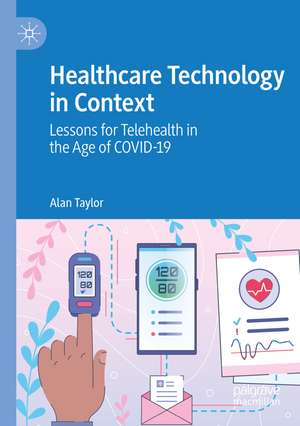Healthcare Technology in Context: Lessons for Telehealth in the Age of COVID-19
Autor Alan Tayloren Limba Engleză Paperback – 10 sep 2022
| Toate formatele și edițiile | Preț | Express |
|---|---|---|
| Paperback (1) | 888.80 lei 6-8 săpt. | |
| Springer Nature Singapore – 10 sep 2022 | 888.80 lei 6-8 săpt. | |
| Hardback (1) | 894.03 lei 6-8 săpt. | |
| Springer Nature Singapore – 9 sep 2021 | 894.03 lei 6-8 săpt. |
Preț: 888.80 lei
Preț vechi: 1083.90 lei
-18% Nou
Puncte Express: 1333
Preț estimativ în valută:
170.07€ • 178.21$ • 140.59£
170.07€ • 178.21$ • 140.59£
Carte tipărită la comandă
Livrare economică 11-25 aprilie
Preluare comenzi: 021 569.72.76
Specificații
ISBN-13: 9789811640773
ISBN-10: 9811640777
Pagini: 298
Ilustrații: XIX, 298 p. 12 illus.
Dimensiuni: 148 x 210 mm
Greutate: 0.38 kg
Ediția:1st ed. 2021
Editura: Springer Nature Singapore
Colecția Palgrave Macmillan
Locul publicării:Singapore, Singapore
ISBN-10: 9811640777
Pagini: 298
Ilustrații: XIX, 298 p. 12 illus.
Dimensiuni: 148 x 210 mm
Greutate: 0.38 kg
Ediția:1st ed. 2021
Editura: Springer Nature Singapore
Colecția Palgrave Macmillan
Locul publicării:Singapore, Singapore
Cuprins
1. Introduction.- 2. Organisational and Professional Practice of Telehealth.- 3. Incorporating Technologies into Telehealth Services.- 4. Healthcare in Australia and Brazil.- 5. Telehealth Services in Australia and Brazil.- 6. Organisational Structures Influence Telehealth Services.- 7. Contested Professional Practices When Care Is Separated.- 8. Legitimising Telehealth Services.- 9. Building Confidence in Telehealth Practices.- 10. Building Relationships to Underpin Telehealth Practices.- 11. Applying Resources to Telehealth Services.- 12. How Contexts and Mechanisms Influence Telehealth Services.- 13. Telehealth Services in the Age of the COVID-19 Pandemic.
Notă biografică
Dr. Alan Taylor led the development of IS 13131:2021 Health informatics—Telehealth services—Quality planning guidelines for the International Standards Organisation. Between 2016 and 2020 he served as Vice President of the Australasian Telehealth Society. His research investigates the sustainability of telehealth services including the role of standards, guidelines, socio-technical codes and the impact of the COVID-19 pandemic. He has twenty years of experience in the public and private sectors in Australia, Europe and Africa as a project manager, academic, ICT strategist, and architect. He has led numerous telehealth and emergency services initiatives in Queensland and South Australia to improve access to health care using information and communications technologies.
Textul de pe ultima copertă
‘As many of us have discovered in the COVID-19 era, telehealth is not plug and play. This in-depth, interdisciplinary analysis of two contrasting health systems by someone who has made technology work in challenging circumstances has many lessons for the wider world.’
—Trisha Greenhalgh, Professor of Primary Care Health Sciences, University of Oxford, UK
‘In an original contribution on the incorporation of telehealth by public health systems, Taylor develops a comparative case study between Australia and Brazil. He offers interesting insights into conceptual frameworks, the importance of the political context, the governance structure, as well as the relationship between professionals, managers, stakeholders, shaping the provision of services through telehealth, before and after COVID-19.’
—Ana Estela Haddad, PhD, Free Lecturer, Associate Professor, University of Sao Paulo, Coordinator, Brazilian Telehealth Program 2007 to 2012, Ministry of Health, Brazil
‘In 2020, our lives changed. And the way we delivered healthcare changed as well. The rapid adoption of telehealth in countries across the globe has transformed healthcare, bringing both opportunities and risks. This timely publication examines the phenomenon of telehealth in the age of COVID-19.’
—Michael Kidd AM, Professor of Primary Care Reform, The Australian National University, Canberra, Australia
‘Not only does Alan Taylor make an important contribution to our understanding of telehealth in times of crisis, he also adds a very important dimension to our understanding what lies behind the success or failure of healthcare interventions. His identification of the huge significance of pre-existing social and cultural contexts is something that everyone involved in developing or evaluating health services should take to heart.’
—Sam Porter, Professor of Nursing Sociology, Head of Department of Social Sciences and Social Work, Bournemouth University
Caracteristici
Explores the mechanisms influencing telehealth services in the context of the Australian and Brazilian universal healthcare systems and the outbreak of the COVID-19 pandemic Examines how technology supports separated care through a discussion of contemporary fears and beliefs about technology, organisational issues and the sociotechnical codes that align medical practice Concludes that provision of telehealth services as a part of a new normal for healthcare will depend on how we collectively shape the use of technology
